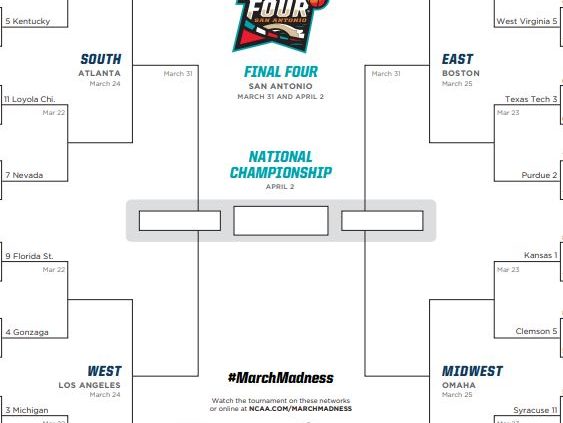JLWOP in the 2018 NCAA Tournament Sweet Sixteen

You can’t go much of anywhere in March without finding yourself in a conversation about the NCAA Basketball Championship — better known as ‘March Madness’ — and it’s similarly difficult to spend much time in our office without quickly gaining a handle on JLWOP and other extreme sentences for you in states across the country. Let’s take a look at the states represented in this year’s Sweet Sixteen:
South Region
Kansas State vs Kentucky
Both Kansas and Kentucky are among the 20 states that have abolished JLWOP. However, Kansas has not addressed other lengthy sentences for kids, so-called de facto life sentences, such as a 100-year term that is functionally the same as “life” and yet is still legal. Kentucky abolished JLWOP in 2008 but still has a handful of prisoners serving life sentences for crimes committed as children.
Loyola-Chicago vs Nevada
Unlike the region’s other matchup, this game features a state that still imposes JLWOP sentences in Illinois. That said, dozens of men and women have been paroled and are coming home in the Prairie State. Nevada, on the other hand, passed legislation in 2015 that banned JLWOP and provided for parole after 15 or 20 years, depending on the crime. The state does, however, still have a few prisoners serving JLWOP.
West Region
Florida State vs Gonzaga
Both Florida and Washington still allow for JLWOP sentences, though in Florida it is only available as an option in limited circumstances. Both states, however, see progress in the courts. Notably, a Florida Supreme Court decision provided opportunity for relief to thousands of prisoners. In Washington, litigation is currently pending at the state Supreme Court that could ban JLWOP under the Washington state constitution.
Michigan vs Texas A&M
Michigan has sentenced more children to JLWOP than almost any state in the union, and while some are finding relief and coming home in the wake of Montgomery v. Louisiana, prosecutors in the Wolverine State seek a reimposition of JLWOP in 60% of resentencing hearings, flouting the U.S. Supreme Court’s ruling in Montgomery that JLWOP be applied only in rare circumstances. Texas abolished JLWOP after Miller v. Alabama, but maintains a 40-year minimum sentence before parole, a much longer minimum than other states have implemented.
East Region
Villanova vs West Virginia
Pennsylvania, and Philadelphia in particular, historically has used JLWOP more than anywhere else in the country — at the time of Montgomery, more than 500 men and women were serving life sentences for crimes they committed as children — but a recent state Supreme Court decision and a new District Attorney in Philadelphia have led to more than 100 people statewide coming home. West Virginia passed legislation in 2014 that serves as a model to the rest of the country and provides for parole after 15 years for all children who commit serious crimes. However, no one in West Virginia who was sentenced to life without parole has actually been paroled as a result of this bill.
Texas Tech vs Purdue
Texas abolished JLWOP after Miller v. Alabama, but maintains a 40-year minimum sentence before parole, a much longer minimum than other states have implemented. Indiana still utilizes JLWOP along with neighbors in Ohio, Illinois, and Michigan.
Midwest Region
Kansas vs Clemson
Kansas has abolished JLWOP but not addressed other lengthy sentences for kids, so-called de facto life sentences, such as a 100-year term that is functionally the same as “life” and yet is still legal. South Carolina still uses the sentence, but is currently considering legislation that would ban JLWOP in the Palmetto State.
Syracuse vs North Carolina
Much like Kansas, New York has no one serving JLWOP, but utilizes de facto sentences that will keep a child in prison for decades before a chance at parole. North Carolina still imposes JLWOP on children, but most people resentenced as a result of Montgomery are receiving parole-eligible sentences.



